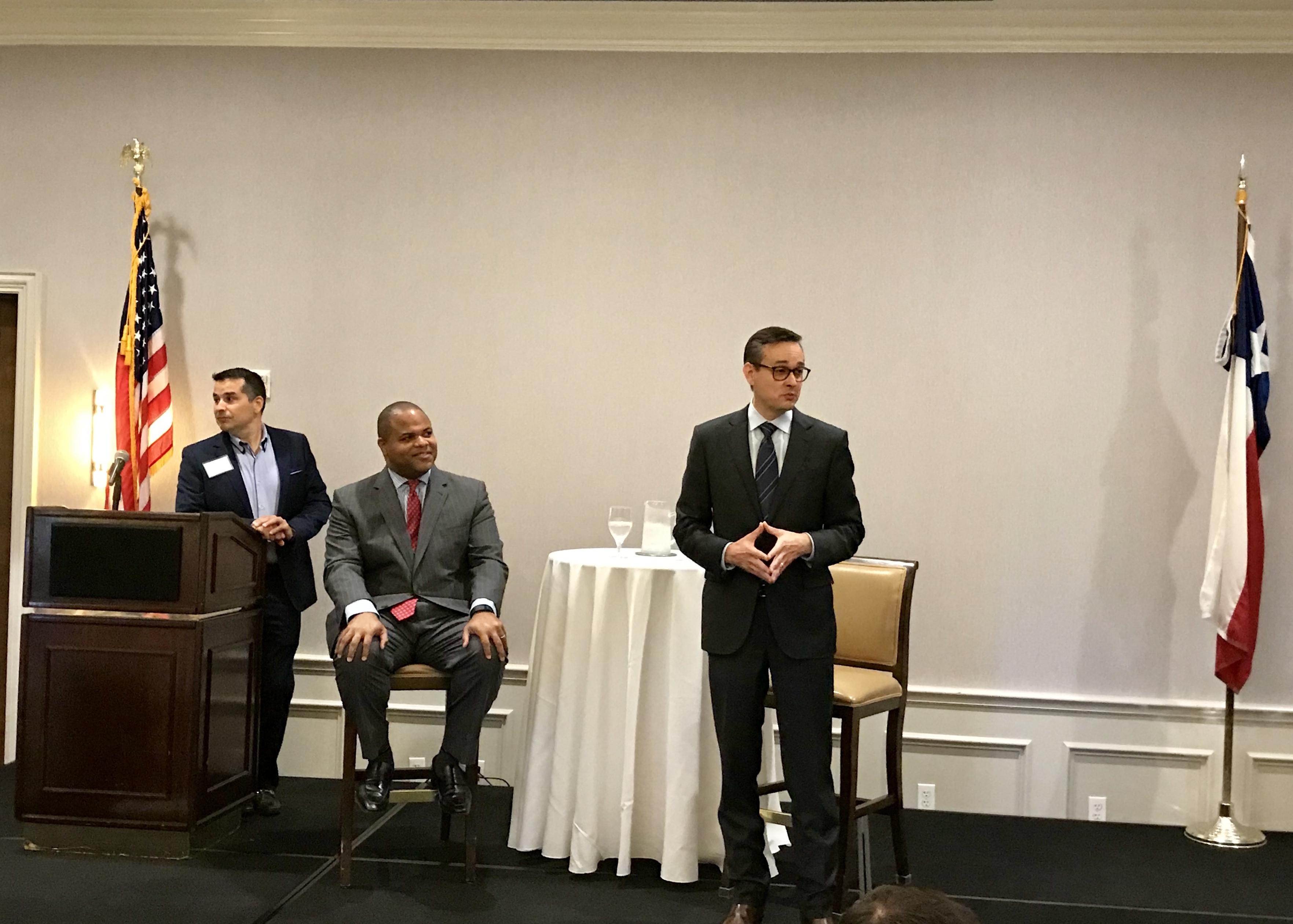Eric Johnson on Friday presented a new narrative about the roots of his mayoral bid. In front of an East Dallas crowd, the state legislator said he still has “the tire tracks on my back” from what Councilman Philip Kingston, a close ally of his opponent Scott Griggs, did to him during a clash over Lakewood’s 3G intersection redo.
“You could almost say that that experience singlehandedly thrust me into the mayor’s race,” he said, “because I saw firsthand, honestly, for the first time ever I was directly impacted by the tactics that has caused our City Council to become as divided as it currently is.”
Johnson has made what he says are divisive tactics by Griggs a well-worn talking point during the election, but he’d saved—based on our own and other news outlets’ reporting—this campaign origin story for Friday’s lunchtime crowd at the Lakewood Country Club. Griggs and Johnson squared off there in one of their final debates before Election Day on June 8. The event was hosted by the East Dallas Chamber of Commerce and predominately attended by its members.
Few hyper-local topics have generated more civic debate in recent years than the precarious intersection at Gaston Avenue, Garland Road, and Grand Avenue. The three-year-old project was complicated, among other reasons, because Garland and Grand form a state highway, meaning TxDOT took the lead. Six initial intersection options dwindled to two. Johnson backed Option 2 after two years of what on Friday he called the most collaborative and data-driven process in which he’s ever taken part. (Sarah Lamb, who co-founded a Lakewood traffic coalition that opposed Option 2 and unsuccessfully ran for the District 9 Council seat, pushed back on that notion. She says Johnson didn’t show up for public hearings and shooed her away when she tried to get a meeting.)
That option also eventually earned the approval of outgoing District 9 Councilman Mark Clayton, whose district encompasses the intersection. But Kingston, along with the coalition, said the plan overloaded Gaston. They wanted a tweak that they say would’ve kept more traffic on Grand. Johnson said Friday that in pursuit of the change, Kingston claimed they were “going to turn Gaston into a race track and that children were going to get mowed down.”
Kingston had this to say: “I definitely said to him that he was going to make the most dangerous street in Dallas worse. It’s still true, by the way.”
Johnson and Griggs weren’t on stage much more than a half hour, and several of the topics they touched on were explored in recent debates. For a deeper dive into a policy-heavy discussion earlier this week, head here. A few other takeaways from Friday’s showdown below.
Scott Griggs Wants to Clone Himself. And Eric Johnson would rather fly. Those are their preferred super powers, question one of the afternoon. Griggs wants to be in two places at once so he can be with his family while working. Johnson wants to skip the traffic on Gaston or I-30 and get to City Hall quicker.
Eric Johnson Wants a Workforce Committee. Actually, he’s preliminarily calling it the “Education and Workforce Committee.” This is Johnson’s No. 1 priority (Griggs has public safety in that spot), as he’s able to tie workforce training to things like developing the southern half of the city, convincing corporate relocations to choose Dallas over the suburbs, and growing the tax base south of the Trinity. Friday was the first time he’s declared that he wants a special Council committee toward that end. For his part, Griggs answered the same question by saying that he’d like to break the Economic Development and Housing Committee in two.
Scott Griggs Has a Five-Point Ethics Plan. He wants to cut off communication between housing developers who file for low income tax credits and City Council members prior to their public briefings. He wants an electronic record of people who lobby Council members and the mayor on those cases. He wants to centralize campaign finance reports, lobbyist reports, and these new developer reports into a single, public database. He wants to record closed Council sessions and make them publicly available after there’s no longer a reason to hold them. And he wants an office of professional responsibility that reviews campaign finance fillings after they’re submitted, and bring up issues right away.
When it was his turn, Johnson said his opponent had some interesting ideas about ways to make the ethics code strong. But he continued to angle toward his own credibility on the manner. “What happens in an ethics reform situation is always this: everyone is concerned that they’re going to get one of their buddies in trouble,” Johnson said. “We have to bring people who are not connected to this situation. I am in no way, shape, or form connected to the city of Dallas’ current ethics situation.”
We’ve Reached the “Complete Each Other’s Sentences” Portion of the Runoff. With a short event, the moderator decided to skip the usual opening statements on Friday. But Johnson joked during his first answer of the day about how the two candidates had done enough of these that they could stump for each other. He asked how Griggs’ seven chickens were doing, a star in the councilman’s introductory statements at other forums. And then later, when it was time for closing remarks, Griggs slipped into his normal background-info routine, which includes the rundown of his family, his wife, his three kids, his dog, his cat, and—he pointed over to Johnson, who somewhat sheepishly filled in the blank—“seven chickens.”





